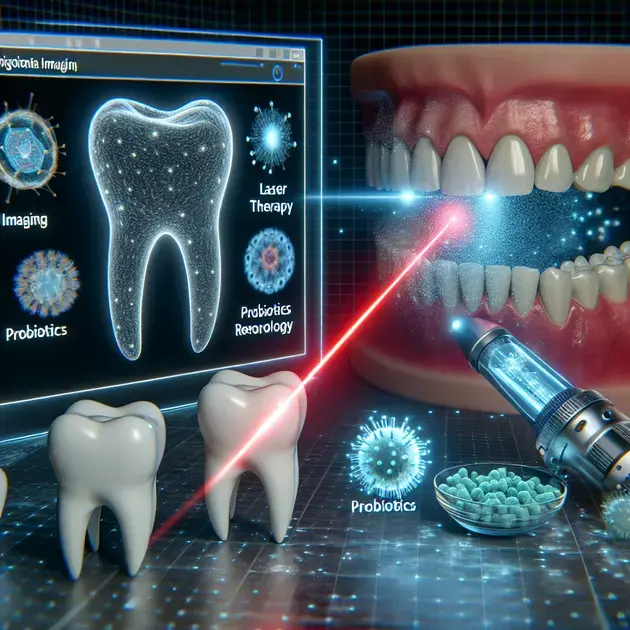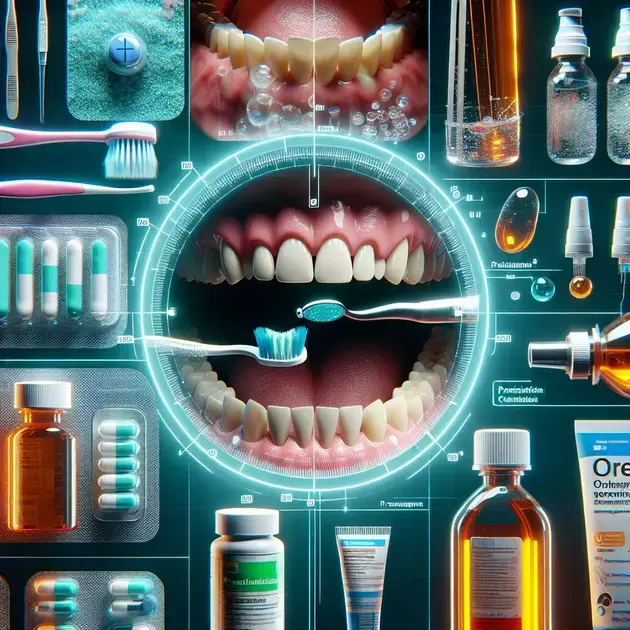When it comes to combating periodontitis, finding the best medication is crucial for effective treatment. In this comprehensive guide, we will explore the top medications recommended by dentists and research studies.
Periodontitis, a severe form of gum disease, can lead to tooth loss and other serious health issues if left untreated. By understanding the best medication options available, you can take proactive steps to improve your oral health and overall well-being.

Effective Medications for Periodontitis Treatment
Periodontitis is a serious gum infection that can lead to damage to the soft tissue and bone supporting the teeth. Treatment for periodontitis may involve the use of medications to help control the infection and promote healing. Here are some effective medications commonly recommended for periodontitis:
1. Antibiotics
Antibiotics are often prescribed to help control bacterial infections associated with periodontitis. Common antibiotics used in periodontal treatment include doxycycline, minocycline, and metronidazole. These medications can help reduce inflammation and infection in the gums, allowing for better periodontal health.
2. Antiseptic Mouthwash
Antiseptic mouthwashes containing ingredients such as chlorhexidine or cetylpyridinium chloride can help reduce plaque and bacteria in the mouth, aiding in the treatment of periodontitis. These mouthwashes are often recommended by dentists as part of a comprehensive oral health routine.
3. Enzyme Suppressants
Enzyme suppressants like sub-antimicrobial dose doxycycline (SDD) can help inhibit enzymes that break down gum tissue, reducing the progression of periodontitis. These medications can be prescribed by dentists to complement other periodontal treatments.
4. Pain Relievers
In cases where periodontitis causes significant discomfort, pain relievers such as ibuprofen or acetaminophen may be recommended to manage pain and swelling. These medications can provide relief while undergoing periodontal treatment.
5. Prescription Mouth Rinses
Prescription mouth rinses containing essential oils or specific antimicrobial agents can help reduce bacteria in the mouth and promote gum healing. Dentists may prescribe these rinses as part of a personalized periodontitis treatment plan.
Top Recommended Medications by Dentists
When it comes to treating periodontitis, dentists often rely on specific medications that have been proven effective in managing gum disease. Here are some of the top medications recommended by dentists for periodontitis treatment:
1. Chlorhexidine Mouthwash
Chlorhexidine mouthwash is a common recommendation by dentists for its antibacterial properties. It can help reduce plaque and inflammation in the gums, promoting better periodontal health. Dentists may prescribe chlorhexidine mouthwash as part of a comprehensive oral hygiene regimen.
2. Doxycycline Gel
Doxycycline gel is a localized antibiotic treatment that can be applied directly to the periodontal pockets where bacteria thrive. This targeted approach helps eliminate harmful bacteria and reduce inflammation, supporting the healing process in the gums.
3. Fluoride Toothpaste
Fluoride toothpaste is essential for maintaining good oral health and preventing tooth decay, which can exacerbate periodontitis. Dentists recommend using fluoride toothpaste to strengthen tooth enamel and protect against bacterial damage.
4. Prescription Antibiotics
In severe cases of periodontitis, dentists may prescribe systemic antibiotics to combat bacterial infections and promote gum healing. These antibiotics are tailored to the specific needs of the patient and are typically used in combination with other periodontal treatments.
5. PerioChip
PerioChip is a prescription medication containing chlorhexidine gluconate that is placed directly into periodontal pockets after scaling and root planing. This sustained-release chip helps control bacteria and reduce inflammation in the gums, supporting the success of periodontal treatment.
Proactive Steps for Improving Oral Health
Maintaining good oral health is essential for preventing periodontitis and other dental issues. Here are some proactive steps you can take to improve your oral health:
1. Brush and Floss Regularly
Establish a daily routine of brushing your teeth at least twice a day and flossing once a day. Use fluoride toothpaste and a soft-bristled toothbrush to effectively remove plaque and bacteria from your teeth and gums.
2. Visit Your Dentist Regularly
Regular dental check-ups and cleanings are crucial for early detection of dental problems, including periodontitis. Schedule routine visits to your dentist for professional cleanings and oral examinations to maintain optimal oral health.
3. Maintain a Balanced Diet
Eating a healthy diet rich in fruits, vegetables, lean proteins, and whole grains can support overall oral health. Limit sugary and acidic foods and beverages that can contribute to tooth decay and gum disease.
4. Avoid Tobacco and Limit Alcohol Consumption
Tobacco use can increase the risk of gum disease and oral cancer, while excessive alcohol consumption can contribute to oral health problems. Avoid tobacco products and moderate your alcohol intake for better oral health.
5. Use Mouthwash and Dental Products Recommended by Your Dentist
Ask your dentist for recommendations on suitable mouthwash, toothpaste, and dental products for your oral health needs. Using dentist-recommended products can enhance your oral hygiene routine and help prevent periodontitis and other dental issues.

Understanding Different Types of Medications for Gum Health
When it comes to gum health, there are various types of medications available to help maintain and improve it. These medications can range from antimicrobial mouthwashes to antibiotics and prescription-strength toothpaste. Understanding the different types of medications for gum health is essential for effectively managing oral care.
Antimicrobial mouthwashes are commonly used to reduce plaque and gingivitis by killing bacteria in the mouth. These mouthwashes can be over-the-counter or prescribed by a dentist for more severe cases. Antibiotics may be prescribed by a dentist to treat gum infections or periodontal disease. It’s important to follow the prescribed dosage and duration to ensure the medication is effective.
Prescription-strength toothpaste containing fluoride or other active ingredients can also help improve gum health by strengthening enamel and reducing plaque buildup. These toothpastes are recommended for individuals with specific oral health issues that regular toothpaste may not address.
Overall, understanding the different types of medications for gum health can empower individuals to make informed choices about their oral care routines and work towards healthier gums.
Top Medication Recommendations for Healthy Gums
When it comes to maintaining healthy gums, certain medications are highly recommended by oral health professionals. These medications have been proven effective in promoting gum health and preventing common oral issues such as gum disease and tooth decay.
One of the top medication recommendations for healthy gums is a prescription-strength antimicrobial mouthwash. This type of mouthwash can help reduce bacteria in the mouth, prevent plaque buildup, and improve overall gum health when used as directed by a dentist.
Another recommended medication for healthy gums is a fluoride toothpaste. Fluoride is known for its ability to strengthen enamel, protect against cavities, and promote gum health. Using a fluoride toothpaste as part of your daily oral care routine can contribute to healthier gums.
For individuals with specific gum health concerns, such as periodontal disease, a dentist may prescribe antibiotics to help treat the infection and restore gum health. Following the prescribed dosage and duration is crucial to the effectiveness of the medication.
Incorporating these top medication recommendations for healthy gums into your oral care routine can make a significant difference in maintaining optimal gum health and overall oral well-being.
Effective Strategies for Maintaining Oral Medication Compliance
Maintaining oral medication compliance is crucial for ensuring the effectiveness of the prescribed treatment and achieving desired outcomes for gum health. To stay on track with oral medication, consider the following strategies:
1. Set a daily reminder: Use alarms, phone notifications, or pill organizers to remind you to take your medication at the correct time each day.
2. Keep medications visible: Store your medications in a visible location to serve as a visual reminder to take them as prescribed.
3. Establish a routine: Incorporate taking your oral medication into your daily routine, such as after brushing your teeth in the morning or before bedtime.
4. Track your medication: Keep a medication journal or use a mobile app to track when you take each dose and monitor your compliance over time.
By implementing these effective strategies for maintaining oral medication compliance, you can ensure that you are consistently following your prescribed treatment plan and optimizing the benefits for your gum health.
Conclusion
Understanding the different types of medications for gum health is crucial in managing oral care effectively. From antimicrobial mouthwashes to prescription-strength toothpaste, these medications play a significant role in maintaining and improving gum health. Antimicrobial mouthwashes help reduce plaque and gingivitis by eliminating bacteria, while antibiotics are essential for treating gum infections and periodontal disease. Prescription-strength toothpaste, containing fluoride and other active ingredients, strengthens enamel and minimizes plaque buildup, addressing specific oral health issues that regular toothpaste may not.
When looking to maintain healthy gums, top medication recommendations include prescription-strength antimicrobial mouthwash and fluoride toothpaste. These medications are proven to promote gum health, prevent gum disease, and tooth decay. Following the dentist’s guidance on dosage and duration is crucial to ensure the medication’s effectiveness. For individuals with specific gum health concerns like periodontal disease, antibiotics may be prescribed to combat infections and restore gum health.
Maintaining oral medication compliance is key to ensuring the success of treatment and achieving desired outcomes for gum health. Strategies such as setting daily reminders using alarms or pill organizers, keeping medications visible, incorporating medication into daily routines, and tracking doses via a journal or mobile app are effective ways to stay on track. By following these strategies, individuals can adhere to their prescribed treatment plans and maximize the benefits for their gum health, ultimately leading to healthier gums and overall oral well-being.



